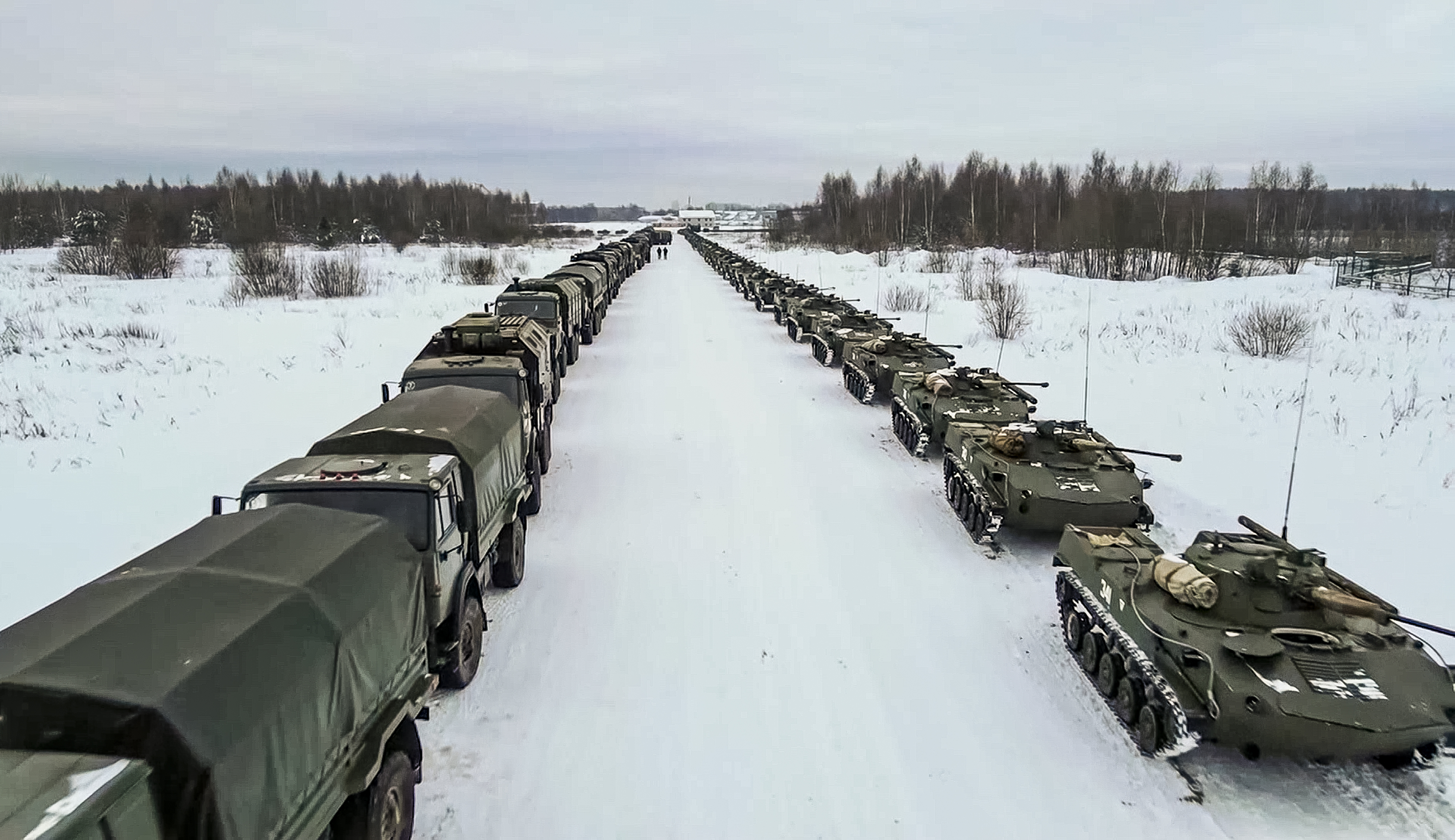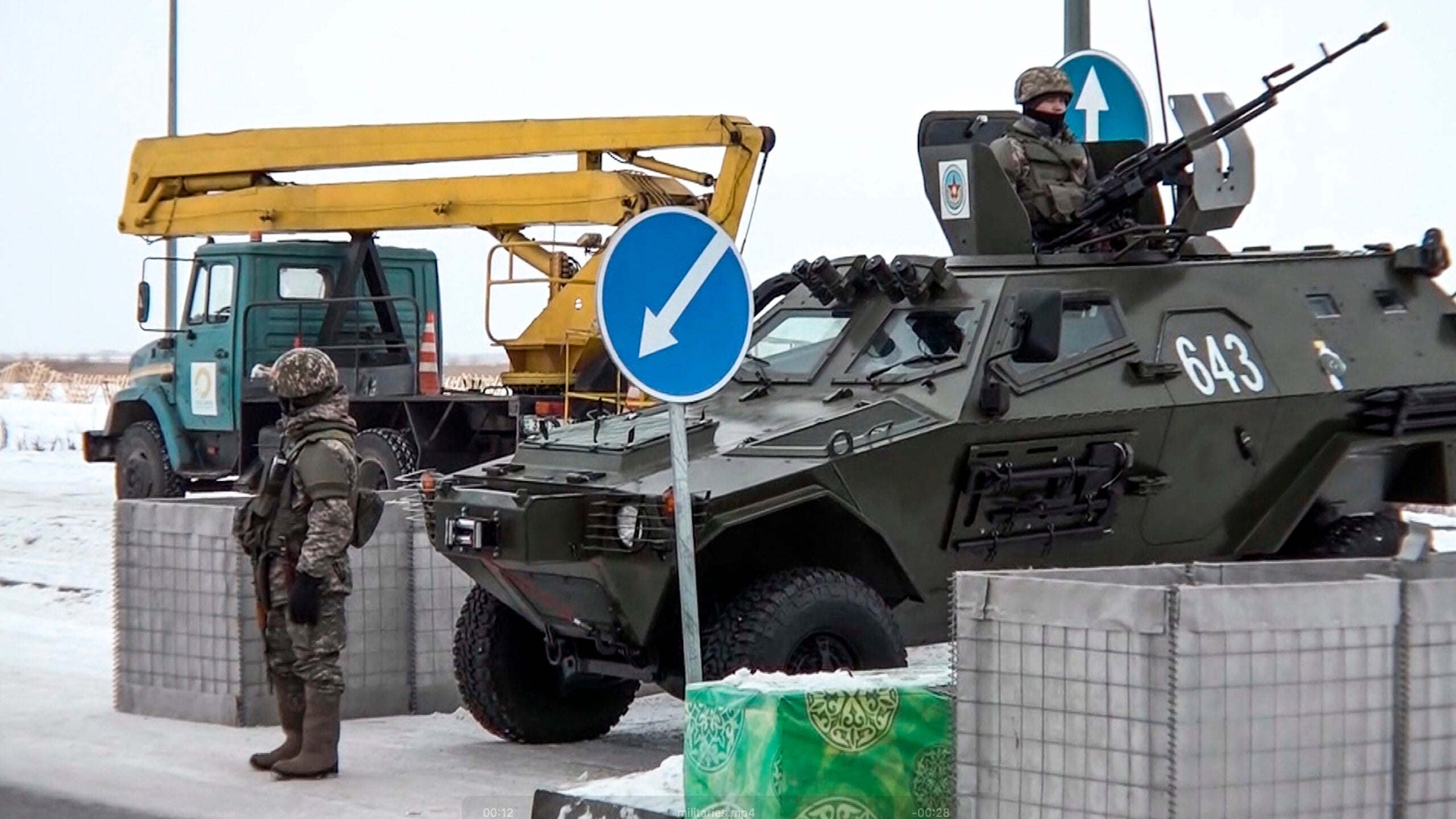Kazakhstan’s president, Qasym-Zhomart Toqaev, has significantly raised the stakes in the country’s ongoing unrest, giving his security forces and troops permission to “open fire with lethal force,” and without warning, during an address today. The president branded the protesters as “bandits and terrorists” as he doubled down on the crackdown, which now involves ‘peacekeeping forces’ that are arriving from the Collective Security Treaty Organization, or CSTO, the multinational security bloc in which Russia is the chief member. You read up on the background to the current situation in Kazakhstan in our previous reporting here.
The open civil unrest began in Kazakhstan this week after a sudden hike in fuel prices, combined with long-running dissatisfaction over the economic and political situation, which in turn triggered mass protests. Two days ago the CSTO agreed to send troops to support the embattled Toqaev regime. The president said today that CSTO troops — from Belarus, Kyrgyzstan, and Russia — had not yet been engaged in the fighting. Nevertheless, this is the first time that this bloc has responded to such a request. Russian forces in the country include BMD and BTR-D light tracked armored vehicles, 8×8 BTR-82A light wheeled armored vehicles, and other light armored and tactical vehicles, plus troops. Russia has also deployed the Leer-3 electronic warfare system, which includes drones carrying jammers and can be used to interfere with cellphone communications.

Now, with the unrest showing no signs of abating, Tokayev has gone on the offensive, giving a hardline address today. As well as giving the order for the use of lethal force against the protesters, without warning, the president blamed “so-called free media outlets” for helping to foment unrest in the country.
It’s unclear what effect Tokayev’s order will have on the government’s handling of the demonstrations but reports from the country indicate that dozens of protesters have already been killed. The country’s interior ministry reports that more than 3,000 people have now been detained, while there are reports of security forces firing on and killing and wounding groups of protesters during violent clashes.
This comes after a statement from a state police spokesperson, Saltanat Azirbek, who said that “dozens of attackers were liquidated,” in an interview on state television. As we examined yesterday, the exact meaning of this phrase is not entirely clear, but it does at least tally with reports of a very heavy-handed response by local security forces.
According to Tokayev’s address, “20,000 bandits” were involved in the unrest in Almaty, Kazakhstan’s largest city, which has been the epicenter of the demonstrations. The city has seen government buildings and the presidential residence stormed by demonstrators, while other buildings have been set on fire, and there has been widespread looting.
Officials in Almaty have reported that 18 members of the police and the national guard have been killed so far and another 748 injured, although these figures have not been independently verified. Unconfirmed reports from Kazakhstan’s state media outlets claim that protesters are also using civilians as human shields, to further complicate the police’s response to the violence.
The president today also ridiculed suggestions that the government conduct talks with protesters, branding this proposal as “idiocy” and ruling out negotiations “with armed and well-prepared bandits, both local and foreign.” Tokayev went on to say that these forces would be “destroyed… in the nearest time.”
While unconfirmed, there are also reports that a first organized rebel group has been established to challenge the regime. A video that has appeared on social media purports to show the self-styled Kazakhstan Liberation Front, with militants apparently armed with AKM assault rifles and an RPK light machine gun. There is also an apparent manifesto and flag. Again, this remains unverified, but if true, the first such rebel group would be a significant development.
Despite the regime rhetoric, and claims from the government that the situation is now being brought under control across the country, accounts of violent clashes and gunfire continue to emerge from Almaty and elsewhere.
The airport in Almaty, which fell into the hands of protesters yesterday, has now reportedly been retaken, with the Russian defense ministry stating that its troops were now protecting the facility, as well as other vital infrastructure. Russian officials have also said that their peacekeeping forces are ensuring the security of Baikonur, home of the Russian space program in Kazakhstan.
Outside of Almaty, it seems there is continued unrest in Aktobe in the west of the country and Taldykorgan in the southeast. There are also reports that most of the country’s internet and cellphone networks are still down.
Footage of protesters removing the statue of the former president of Kazakhstan, Nursultan Nazarbayev:
Despite the ongoing crackdown, it seems that Tokayev is making at least some kind of an attempt to respond to some of the demands of the protesters. He has already sacked his cabinet and stripped former president Nazarbayev of his key position as head of the country’s security council. There are now suggestions that the capital, Nur-Sultan, named in honor of Nazarbayev, may revert back to its previous name, Astana.
Within the international community, there is a feeling that little can be done to influence the events in Kazakhstan. So far, the response has been limited to statements from officials, including the U.S. Secretary of State, Antony Blinken, who has spoken to his Kazakh counterpart, Mukhtar Tileuberdi.
The State Department said that Blinken “advocated for a peaceful, rights-respecting resolution to the crisis.”
With more CSTO forces being deployed in the country, the fear is that the use of force on behalf of the regime will continue and perhaps even escalate. The bellicose words from the Kazakh president today will have done little to allay those concerns.
Contact the author: thomas@thedrive.com
